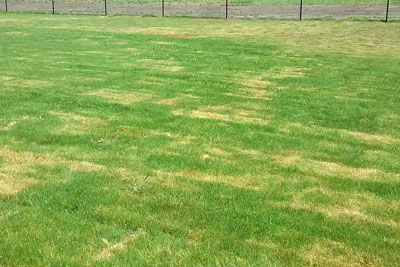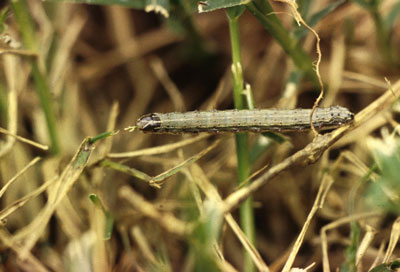Armyworms On the Move
All of a sudden the questions started pouring in. Everywhere I turned Friday and Saturday it seemed like bermuda lawns were turning brown. People were posting photos of caterpillars on Facebook, and as I ran errands Saturday afternoon in the DFW area, I saw flocks of birds dining on the larvae in the middle of the browning bermuda in home lawns and medians alike. Someone even posted a photo of a zoysia lawn that looked just the same. And the questions have continued all week!

Photo: Photo posted by Facebook friend Shelly W. shows damage done by fall armyworms as they devour blades of a bermuda lawn.

Photo: Close-up of one armyworm caterpillar, as shown on Texas A&M publication “Armyworms in Turfgrass”.
I’m fairly used to getting this question in late August or September, but this seemed unusually early. It was apparent that there was an outbreak of armyworms. And that there still is as you’re reading this. I made that comment over the weekend on my Facebook page, and people from many areas reported similar issues.
The important facts…
• Fall armyworms are the larval form of a fairly harmless looking moth.
• They are more common in years when there have been abundant rains in late spring and summer.
• They prefer bermudagrass. They rarely bother St. Augustine.
• The larvae feed on the grass blades, but they leave the runners and roots alone. The affected areas take on a dry, browned appearance.
• Because they only feed on blades, the grass really isn’t hurt all that badly. It generally rebounds within a couple of weeks.
• Nitrogen and water will speed the recovery.
• Most insecticides will control armyworms very successfully. Bacillus thuringiensis, Spinosad and Sevin are all good, among many others. These should present no threat to the birds.
• If you have browned areas in your bermuda (or zoysia) turf, and if you’re fairly sure that you’re watering adequately, examine the lawn closely for armyworm caterpillars. If you find them, and if the damage rises to the level shown in the photo, treat with an insecticide.
